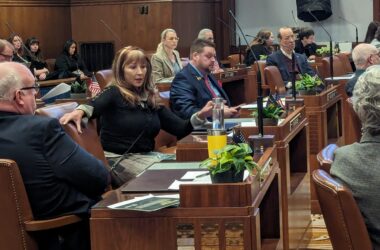Four C’s guide Sen. Daniel Bonham in his approach to legislative work and his new role leading the Senate Republican caucus.
First, the Constitution: Does a bill align with the state and federal constitutions?
Next, his conscience.
“You have to sleep at night, and I have to live with myself and I have to live with my vote,” Bonham told the Capital Chronicle. “And those are my first two cornerstones, and then it’s my constituents that sent me here to elect me to do a job, and finally it’s the caucus.”
The first three coexist easily – he trusts that the constituents in his The Dalles-based district who sent him to Salem expect him to follow his conscience and to honor the Constitution. But as Bonham prepares to take on a new role as leader of the 11-member Senate Republican caucus on April 15, he’s also trying to balance the needs of a diverse caucus with senators who represent swing districts on the coast, denser urban and suburban areas in the Willamette Valley and sprawling cherry-red districts in eastern Oregon.
Bonham, a freshman, is taking the reins at a tumultuous time. Ten Republican senators, including Bonham and outgoing Senate Minority Leader Tim Knopp, R-Bend, are barred from running for reelection in 2024 or 2026 because of their participation in a six-week quorum-denying walkout in 2023 that conflicted with a voter-approved constitutional amendment that bars lawmakers with 10 or more unexcused absences from serving the next term. Six of the affected senators, including Knopp, will leave the Senate in January, while Bonham and Sens. Kim Thatcher of Keizer, Cedric Hayden of Fall Creek and Suzanne Weber of Tillamook are serving terms that will end in early 2027.
Along with losing experienced senators, Republicans are on the defensive in the 2024 elections. Democrats hold 17 seats in the 30-member Senate and need just one more to gain a supermajority that would allow them to approve new or higher taxes without Republican support. They have high hopes of picking up Knopp’s newly open Bend-based district and unseating Sen. Dick Anderson, R-Lincoln City, while Republicans have better odds of flipping Democratic districts in midterm years.
“I think we’re realistic about opportunities, which seats may or may not be competitive,” Bonham said. “Our great desire would be to hold the seats that we have. Simultaneously, I think we’d like to compete somewhere, so we’re looking at the maps carefully.”
Knopp, who nominated Bonham as leader during a private caucus meeting last week, told reporters at the end of the legislative session that he planned to lean into campaign work to the degree the caucus wanted his help. Bonham said he values Knopp’s experience and expertise and wants him to stay involved. Knopp’s experience as a Republican representing a fairly liberal district is invaluable, he said.
“He’s got a heart for Oregon,” Bonham said. “He cares about the state in a real deep, meaningful way, and I don’t see him walking away without trying to help us put our best foot forward to make sure we restore balance to Oregon.”
A phone call
Bonham’s entry into state politics started with reading the news: He was sitting at his home in fall 2017 when he read that then-Rep. John Huffman, R-The Dalles, planned to resign before his term ended to take a job with the Trump administration and that local county commissioners would appoint a replacement. He called a county commissioner he knew, was redirected to a local party official and a few weeks later, Bonham was sworn into the state House.
“I think it’s a pretty common story for a lot of Republicans that ended up getting into this,” Bonham said. “It wasn’t necessarily anything I had been planning for, I wasn’t trying to build a resume for it, but I was intrigued by how the state of Oregon governs itself and who was representing us.”
When he looked around the Legislature, he said he didn’t see many people who looked like him: small business owners, or relatively young people with different experiences to draw from than the baby boomers and older generations who dominated state politics. At the time he took office, he was 40 and one of the youngest members of the House. That’s changed a bit since Bonham arrived – about one-fifth of the state House is now younger than 40, though the now 46-year-old Bonham remains the second-youngest member of the state Senate.
While Bonham has participated in Republican-led walkouts both during his time in the House and Senate and hasn’t ruled out leading a walkout as caucus leader, he said the tactic, which is used to deny a quorum, isn’t a healthy way to govern. Republicans wouldn’t turn to walkouts if they felt like they were more included in political conversations, he said.

“I’ve always said it’s a terrible way to govern, and yet I’ve done it twice,” he said. “It’s such a hopeless feeling when you get to the point in a session where you’re ramming your head into a concrete wall and the majority party refuses to include you and negotiate with you and wants to ram something down that you believe is inherently unpopular statewide.”
Bonham is close with House Republican leader Jeff Helfrich, R-Hood River – not only are they neighbors in the Columbia River Gorge and served in the House at the same time, Helfrich rents a room from Bonham in a Salem house during the legislative session. Sen. David Brock Smith, R-Port Orford and the new deputy Republican leader, also roomed with them.
Bonham will start as leader with a friendlier relationship with Senate President Rob Wagner, D-Lake Oswego, than Knopp – who slammed Wagner as “untrustworthy, deeply partisan” and lacking the skills to run the chamber in a bipartisan fashion when he was elected. Bonham said he and Wagner have tried to make sure they had strong direct communication, and Wagner was more transparent in 2024 than in 2023 about upcoming legislation.
“My take on Rob Wagner is he wants to be a good Senate president,” Bonham said. “He wants there to be honest, robust debate. That’s my experience with him. In his heart of hearts, that’s really what he wants.”
He said he has teased both Wagner and Senate Majority Leader Kate Lieber, D-Beaverton, about how he wishes they weren’t so likable.
A ‘working relationship’
But while Knopp got along well with Gov. Tina Kotek, Bonham has been one of her harshest critics. Their biggest disagreement stems from 2021 debates over redistricting. Kotek first named Bonham as one of three Republican members on an evenly split committee in charge of drawing new legislative and congressional maps, then reneged on her promise. In the end, a committee of two Democrats and one Republican approved a new congressional map that gave Democrats an advantage in five out of the state’s six congressional districts despite Republican candidates for statewide offices typically receiving at least 40% of the vote.
“The personal challenges will still exist,” Bonham said. “There’s not a lot of trust, but simultaneously she’s the governor, so anything the Legislature is gonna do is going to meet with her veto or approval and she’s gonna manage the executive branch. It’ll definitely be a working relationship.”
Bonham said he’ll reintroduce a bill he backed in previous years to establish an independent redistricting commission instead of having lawmakers draw their own districts. He doesn’t expect lawmakers to pass it – why, he reasons, would Democrats who have controlled the Legislature for years and don’t anticipate losing control cede some of their power to an independent body? But he wants lawmakers to have a conversation about the issue before backers of a potential 2028 ballot measure move forward with their own citizen-led law.
Before leaving the Senate, he wants to pass a version of Ezra’s Law, the bill he has pushed since 2019 in honor of Ezra Jerome Thomas, a Jefferson County boy who was left permanently and severely disabled after his mother’s boyfriend beat him when he was 2 years old. The man is now serving 12 years in prison for attempted murder of Ezra, who will never walk, talk or see clearly again, but Bonham argues that’s not enough.
Under the state’s sentencing laws, murder carries a mandatory minimum sentence of 25 years in prison. Attempted murder carries a mandatory minimum of 7.5 years in prison. Bonham is seeking a new presumptive prison sentence of 25 years for any assault or attempted murder that results in the permanent loss of a victim’s vision, hearing or ability to walk, breathe, eat or move their limbs or impaired cognitive function.
“If you intentionally tried to shoot somebody in the head, and it happened to go through their eyeball and out the back but left them alive but significantly impaired, I think that’s more than just attempted murder where you fire the bullet near them and it didn’t hit them,” he said. “One, the victim may have some emotional and mental trauma but the other one, their life is completely destroyed.”

Julia Shumway is deputy editor of Oregon Capital Chronicle and has reported on government and politics in Iowa and Nebraska, spent time at the Bend Bulletin and most recently was a legislative reporter for the Arizona Capitol Times in Phoenix. An award-winning journalist, Julia most recently reported on the tangled efforts to audit the presidential results in Arizona.









